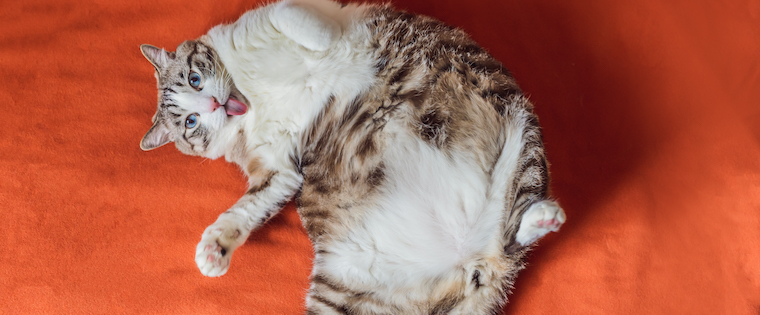Ah, January: the month when many people pledge to lose weight and exercise more. While this lifestyle change is often a good goal for humans, it is most certainly a great goal for pets – especially older pets. If you have a senior dog or cat (see our previous blog to know if your pet is a senior), it’s especially important to not let them get overweight.
There are various definitions for when a dog or cat can be considered overweight or obese, but many haven’t been proven by scientific studies (just like with humans, we’re still learning about healthy weight and BMI). In general, though, if your pets look overweight – with rounded sides, a drooping belly and/or a swayed back – they are likely above their healthy weight.
Why do older pets become overweight?
It is fairly common to see weight gain as your pets get older because their needs have changed, but your patterns may not have. According to DVM360, “The total daily energy needs of an average-sized 7-year-old dog may decrease by as much as 20% when compared with its needs as a young adult.” This means that if you continue to feed an older dog the same amount and type of food, he will gain weight. For most dogs and cats, you need to adjust the type and/or amount of food as they get older, since their calorie needs decrease. Talk to your veterinarian about food needs based on your pet’s age and activity level.
Why is obesity dangerous in senior dogs and cats?
Keeping your pets at a healthy weight is about way more than good looks. For senior pets, weight gain can lead to a host of problems.
Obesity in older pets can lead to an increased chance of:
- Arthritis
- Diabetes
- Heart disease
- Breathing problems
- Skin problems
- Cancer
- Other related issues
For this reason, it’s important to talk to your veterinarian about a plan to help your senior dog or cat stay at a healthy weight.
What if my older pet loses weight quickly?
Sudden weight loss, however, is not healthy, and can often be a sign of a bigger problem, especially in cats. Kidney disease, an overactive thyroid (hyperthyroidism) or diabetes can lead to quick weight loss in older cats. For this and other health risks, you should also take your pets to the veterinarian if they have lost weight suddenly.
The bottom line is that extreme weight gain or weight loss – as well as sustained obesity – are never healthy in pets, but are even more dangerous for senior pets. If your senior pet is showing signs of weight issues, or if you’d like to discuss prevention as your pets age, please make an appointment today at Animal Clinic of Woodruff.




